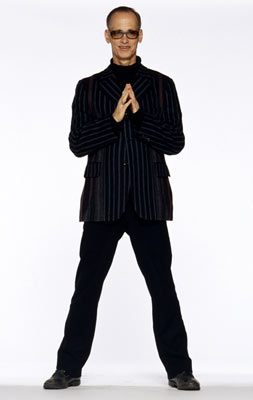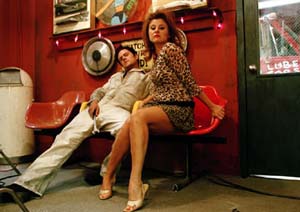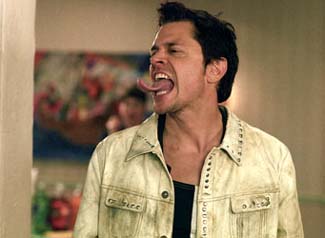
|
|
|
|
Dirtying the Waters: A Dirty Shame
|
|
But if Waters was hit in the head in his own movie, following the "logic" of the story, he says he'd probably become the opposite of what he was before the accident. "Maybe I'd turn straight," he jokes. "That would horrify my world the most." A Dirty Shame, stars Tracey Ullman, Chris Isaak, Johnny Knoxville, and Selma Blair. Ullman plays Sylvia Stickles, a grumpy, sexually uptight housewife who gets knocked on the head only to discover she's "become a rabid cunnilingus bottom," according to the director. Knoxville, best known for MTV's reality series Jack Ass, is Ray-Ray, the leader of the Sex Addicts. The cast is rounded out with Isaak, the sultry crooner turned actor who plays Ullman's husband, Blair as Caprice, their overly endowed, go-go dancing daughter whose stage name is Ursula Udders, and Suzanne Shepherd playing Big Ethel, Sylvia's mother who's leading the battle for Neuter normalcy. A Dirty Shame also includes Waters mainstays Mink Stole and Patricia Hearst. The idea for the movie - and indeed a lot of the research according to the director - comes from his own experiences over three decades. "I went to Hellfire [Club in NYC] way before AIDS, before everything," says the director of his own personal sexual education. "I read the Erotic Minorities in high school, which was the first book about subcultures of sexuality that I had ever heard of." In addition to his own personal curriculum, Waters also read books like The Bear Handbook while researching the movie. "I did some research, but more on the neuter stuff," he says. "Like the restored virgin and that kind of stuff, because I knew little of neuter extremes." Mink Stole's character, Marge the Neuter, explains the idea of restored virginity, where the hymen is sewn up and a capsule of fake blood is inserted to convince a women's husband that she is still a virgin. Waters claims that everything in the film is based on some truth. Even the decency rallies that Big Ethel and Marge staged are part of Waters' memories of Baltimore. "There were decency rallies after Jim Morrison supposedly [exposed himself] in Miami," he says skeptically. "It was at Memorial Stadium and it turned into a race riot. I remember we all howled about it because we were all on LSD at the time and we wanted to go to a decency rally. I'm glad I didn't because it turned violent quickly. And it sort of ended decency rallies in Baltimore."
"So I tried to put in ones that would be humorous, that were more obscure, that were even crazier in a way. Like tickle top. I still don't get that one. I watched a tickle porn video. I don't get it." As Waters explains it, these sexual practices may have once been considered odd, but in his mind at least, they have become more mainstream. "Maybe it is because of sex and because of AIDS, which in my generation was just so, so devastating and it's still devastating because I know 22-year-old people who are HIV infected," he says. "How can you carefully make a movie about these sexual practices [that] before AIDS would have been thought of as dysfunctional and now they are responsible? Because people have had to use their imagination to come up with alternatives to what used to be called normal sex because it's unsafe." Notebook of Fetishes Waters, who doesn't use a computer, preferring to write his scripts out in longhand, tries to write every morning. He fills notebooks with ideas and lists and develops his characters long before he starts writing an actual screenplay. Some of his notebooks are filled with lists of sexual fetishes and euphemisms for sexual practices, like "felching" and "yodeling in the canyon." The movie, in many ways, is a crash course in obscure sexual terms. "'Yodeling in the canyon' was approved by the MPAA [the Motion Picture Association of America] for a trailer that could play with all age audiences," says a surprised Waters. "I guess they didn't get it. It could play with Benjy." Drawing from his own "knowledge" of terms, Waters expanded his vocabulary with research. "You go into any bookstore today, there are many slang, filthy word dictionaries, [books about] sex acts. There's much research on it. I made many, many lists. "But I didn't put in ones that weren't funny, that were offense, like 'hunting the anchovy.' See that one is offensive to me, where 'yodeling in the canyon' is joyous. And I made that decision a lot. It's what I didn't use were the ones that I thought were just not funny. Bad, bad taste." If your vocabulary isn't as rich as Waters', don't worry. It seems members of the Motion Picture Association, which decides what a movie's rating is, weren't familiar with some of the terms used in the film. "I heard that the MPAA, they didn't tell me this officially, but I heard off the record, that one of them was supposedly a doctor who explained what some of the terms meant that I didn't define. But I was hoping they'd bring them up in appeal so I could say 'No! "Felching" is farting in the bathtub and biting the bubbles!' or some other ridiculous term. I mean, who's to prove it? I mean, that isn't what it means, but still how can you prove that? And I thought that this would be a great debate to have with the MPAA, but they were too smart to bring that up. "Has anybody really felched? I guess, but I don't know of anybody. No one's ever told me. I believe that some of these things are urban legends." Time to Make A Sexploitation Movie
To most of America, Waters is best known for Hairspray, the musical he made in 1988 that later went on to become a hit on Broadway, taking home eight Tonys. After years of raunchy movies like Pink Flamingos and Female Trouble, that story brought Waters a certain amount of respectability. "I joked to my mother that my halo was a little tight," he says. But for someone like John Waters, critical success and greater acceptance aren't necessarily a good thing. Some critics have suggested that Waters' more recent movies have been a return to his less-PC days of movie making. "There is a certain humor to me that there is a family that only knows me from [Hairspray] that goes to see [A Dirty Shame] thinking it's going to be like that," he laughs. "Although I think A Dirty Shame could be a musical. Why, Cry Baby is becoming one. Anything could happen in America. Anything." The NPAA gave A Dirty Shame an NC-17 rating, a stigma typically that makes it off limits to a sizeable chunk of the movie-going public. And although the movie is about sex, it doesn't contain any graphic depictions of sexual acts. "I was shocked when I got an NC-17 rating," says Waters. "Believe me, if I was going to make an NC-17 movie, I could make one. But I didn't." Waters, in fact, thinks the real point of the movie is political correctness. "I always said that the joke ad campaign should be 'Can tolerance go too far?' Because to me it is making fun a little bit about political correctness, that every minority is supposed to be OK. Can you go too far? "I'm not saying I know the answer either. Because I made it so there was no middle ground. You're either a neuter or you are a sex addict. "Of course I guess I lay somewhere in between." A Dirty Shame had its U.S. premiere in Baltimore on September 14 and opens nationwide on September 24. |
|
 Director John Waters goes off the deep end again in his latest film A Dirty Shame
Director John Waters goes off the deep end again in his latest film A Dirty Shame A Dirty Shame stars Johnny Knoxville and Tracey Ullman
A Dirty Shame stars Johnny Knoxville and Tracey Ullman  Jackasss Johnny Knoxville
Jackasss Johnny Knoxville